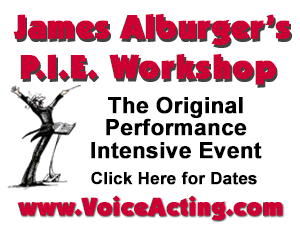|
Article author Barry Abrams - audiobook narrator and veteran ESPN producer - takes a seminar with legendary horse race caller Tom Durkin and then tests his own ability at calling, in this ESPN 'In The Gate Podcast' ... VOICE ACTING 'And Down The Stretch They Come...' How Calling Horse Races Helps With Narration July 3, 2015  By Barry Abrams By Barry AbramsVoice Actor & ESPN Producer I thought I had been straddling two pretty disparate worlds in my burgeoning voice talent career - the audiobook narration one and the thoroughbred horse racing one. But recently, I experienced an eye-opening seminar that showed just how similar those worlds can be. In starting my career as a narrator a few years ago, I learned that many voice talents do podcasting as a way to stay fresh, current, and in practice. So in 2012, I started the In The Gate thoroughbred podcast on ESPN.com’s racing page. For one recent show, I attended a seminar on race calling given by Tom Durkin, who was widely considered the best in the business for a quarter-century. He primarily called races in New York, as well as the Triple Crown and Breeders’ Cup races for NBC. PLOT LINE AND NARRATIVE Durkin was not like most track announcers, though - he had an acting background, dating to his days at St. Norbert College in Wisconsin. As with performing audiobooks, Durkin defined each race by its plot line and narrative. "You have to build tension and release,” Durkin said to the 23 assembled "students,” including one who came all the way from Barbados. "That’s how drama works. Part of it almost musical. So in Ravel’s Bolero, the tempo starts out very slow and the dynamics are very low ... You can start off a race very slowly and then as the race starts to continue, you can increase your volume...” Durkin speaks loudly, though without screaming, and the words whip from his lips much more quickly. TOP ADVICE: READ Interestingly, he also said the number one tenet to becoming a top race caller is to ... read. Read anything. Durkin famously carried with him into the announcer’s booth a homemade thesaurus, a three-ring tabulated binder with words he would randomly encounter through reading. He organized those words into race-specific categories, such as "fast early pace,” "horses running hard at the end,” "muddy conditions,” etc. CALL UP CREATIVE ENERGY A close second behind reading, he said, is energy, and third on Durkin’s list is - energy. Does this sound familiar, narrators and coaches? "From energy comes creative energy,” Durkin said. "And from that creative energy comes new words, new ideas, different ways to try to explain things.” After his seminar, I tried my hand at calling a live race. See the video above for my debut and more tips from Durkin. PRACTICE CALLING A RACE ... For anyone who has - or, like me, who has not yet - taken an acting class, this was a different type of improvisational exercise. You can do it, too. Take an audio recorder and go into the stands at a racetrack or watch a race on TV, and give it a crack. Even if you make up the names of the horses, just try telling the narrative of a race from start to finish. Try it a few times, and you will see how your ability to read printed material will improve. Plus, if you are not careful, you might actually become a fan of horse racing. We need more of those! ------------------------ ABOUT BARRY Barry Abrams is an audiobook narrator, 20+ year veteran producer at ESPN, and host/producer of the In The Gate Podcast on ESPN.com’s horse racing page - also seen on the In The Gate Podcast YouTube channel. Follow him on Twitter @BAbramsVoice or on Facebook at BarryAbramsVoice. Email: info@barryabramsvoice.com Web: www.barryabramsvoice.com |
|
|
Tell Us What YOU Think!
Please Note: Since we check for spam, there will be a slight delay in the actual posting of your comment.
Comments (1)
Elizabeth Holmes
7/3/2015 at 11:59 AM
Thank you for this fun, entertaining article Barry! It's a unique, helpful perspective on voice acting.










click for new article alerts